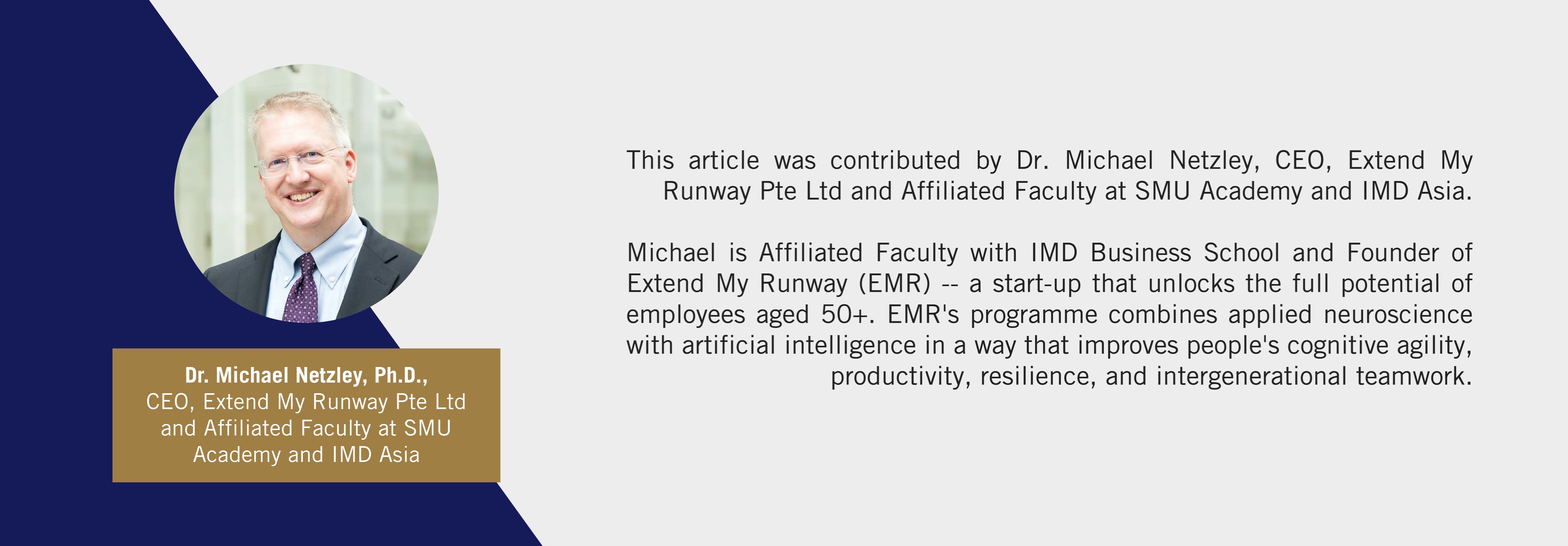
People are living longer. At the start of the 20th century, the average lifespan was 48 years. By the century’s end, this expectancy increased to 74 years, with Singapore boasting an even greater average of 83 years.
Advancements in healthcare have not only extended our lifespans but also improved the quality of these additional years. Nowadays, more people are enjoying longer periods free from chronic or debilitating illnesses. As a result, the desire to remain active and contributory in later years is growing. This trend is evident in Singapore, where the retirement and re-employment ages are on the rise, projected to reach 65 and 70 respectively by 2030 from 63 in 2022.
So, what opportunities does this shift in ageing present?
The answer just might surprise you. Emerging neuroscience is rapidly rewriting the old narrative that we have peaked by 45 and, in its place, emerges an inspiring picture of healthy adults thriving well into their 60s, 70s and even 80s.
This demographic shift and scientific advancements create a profound employment opportunity.
Popular Myths Hide the Available Talent
Current models applied to the ageing workforce fail to identify what is unique about this talent segment.
Perhaps the biggest myth is that of generational differences. This perspective suggests that the year of your birth and the experiences of your generation uniquely define you. Baby boomers are said to be different from Gen X, who are different from Gens Y and Z.
But when social scientists examine this idea, research consistently shows little evidence supporting the objective existence of generational differences. The idea is attractive, but it’s a myth.
Another concept being seriously challenged by the latest research is the idea that we inevitably lose fluid intelligence after age 40 or 45 and must rely on crystallised intelligence.
Fluid intelligence has been described as your “Forbes 30 under 30” brain and is your ability to dynamically reason and solve new or novel challenges. In contrast, crystallised intelligence describes your “Dalai Lama brain” and how we use knowledge and past experiences to deduce and reach conclusions.
The old argument was that fluid intelligence begins to irreversibly decline in your 30s or 40s. However, cutting-edge neuroscience from leading institutions such as Harvard, Stanford, and University of Texas now reveals a third possibility.
The adult mind can dynamically analyse and reason through new challenges by drawing upon a lifetime of experience, thus combining the two intelligences. Stated differently, experience can fuel business-critical thinking and new value creation.
It’s not always an either – or choice between dynamic reasoning and experience.
When we turn to science and set aside old myths, then we can literally train our brains at any age to become more proficient at higher-order thinking. It’s just that during the second half of life such growth is no longer automatic, like in a child, and requires effort.
The Case of Designing a Workplace That Enables Peak Performance
HKS, an award-winning architectural and design firm in Texas, partnered with the Center for BrainHealth at the University of Texas – Dallas to explore if a workplace could enhance peak cognitive performance.
The answer is, yes! 193 employees participated in a six-month pilot programme at HKS. They were invited to measure their brain health, then complete science-backed SMART brain training, and were retested six months later. The results were published in Frontiers in Psychology in 2023.
- 75% of the participants improved their higher order thinking six months later. Thus, the cognitive improvements were enduring and not temporary.
- The greatest gains were achieved by individuals who completed the brain training.
These gains did not differ by age or gender; cognitive gains were similar for all.
The researchers concluded that, “The future of work may be informed by corporate investment in focused efforts to boost collective brain capital through a human-centred, capacity-building approach.”
Dr. Sandra Bond Chapman, Dee Wyly Distinguished Professor in Brain Health and Chief Director of the Center for BrainHealth, highlights the potential for individuals aged 50 to 75 to regain the cognitive speed of their younger selves, bolstered by tactical brain training.
We Can Strengthen Business-Critical Thinking at Any Age
These recent discoveries just might surprise you:
Managing complexity: Harvard Professor Robert Kegan describes how adults transition from one stage of adulthood to another - one such shift happens after 45, or even into our 50s. Those who successfully navigate this major life transition become significantly more capable of managing complexity.
Employee engagement: Numerous studies from Korea to Europe and the United States consistently find that older employees are often more engaged at work than are younger counterparts.
Strategising: The ability to focus on what matters, and to push aside non-essential issues or distractions, can peak in a person’s 50s.
Processing speed: A 2022 article in Nature Human Behaviour reported that the brain’s processing speed does not begin slowing down until after age 60.
Transformative thinking: The Center for BrainHealth reported this platinum cognitive ability can peak in your early 60s.
Innovation: In perhaps the biggest surprise of all, researchers at the Center for BrainHealth report that innovative thinking is one of easiest cognitive abilities to develop. For many, this ability can peak in our early 60s.
In short, different cognitive abilities peak at various life stages, debunking the notion of a single cognitive peak followed by decline.
Longevity is the Talent Opportunity of a Lifetime
The evolving landscape of workforce dynamics, underscored by fresh insights into cognitive longevity, presents an opportunity for you. Delve deeper into these concepts and explore practical applications with SMU Academy’s “Train Your Brain: How to Improve Brain Health and Thrive after 45” programme. Ideal for business leaders, HR professionals, and individuals eager to enhance cognitive capacities, this comprehensive course can equip you with tools and knowledge to leverage cognitive abilities at any age.
As our societies and workforces age, it's crucial to adapt. Recent discoveries highlight unique cognitive strengths that emerge later in life, offering a new perspective on workforce potential. Businesses must embrace these insights, fostering environments where employees can excel in areas like innovation, complex problem-solving, strategic thinking, and engagement. Imagine the impact on your business when employees thrive in these competencies. If you see the potential, it's time to integrate this knowledge into your organisational strategies and rethink workforce development.
This shift in workforce dynamics, fueled by a deeper understanding of cognitive longevity, opens up new possibilities for you. The SMU Academy's "Train Your Brain: How to Improve Brain Health and Thrive after 45" programme is a resource for business leaders, HR professionals, and anyone keen to boost their cognitive skills. This comprehensive course offers the tools and insights needed to harness cognitive abilities at any age.
Join us to explore these brain health concepts and be a part of shaping the future of work.
